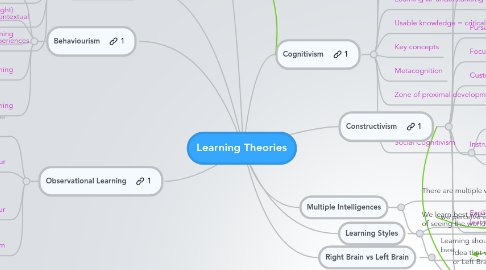
1. Piaget's Developmental Theories
1.1. Brain builds cognitive schema's
1.2. Brain development needs to be considered in educational context
2. Behaviourism
2.1. We learn from exposure to environmental stimuli - positive & negative feedback.
2.2. Trial & Error (no thought)
2.3. Rote learning
2.4. Classic conditioning
2.4.1. Natural 'animal' response
2.4.2. Stimulus & Response
2.5. Behavioual or Operant conditioning
2.5.1. Carrot and stick approach
3. Brain-based Theory
3.1. The brain naturally learns unless inhibited by fear
3.2. Emotion connection to learning
3.3. Conscious and unconscious learning
3.4. Learning must be contextual
3.5. focus on immersive, interactive experiences
4. Observational Learning
4.1. We learn from observing others behaviour and the consequences of that behaviour.
4.2. Acquired Behaviour
4.2.1. Attention
4.2.2. Retention
4.3. Performed Behaviour
4.3.1. Production
4.3.2. Motivation
4.4. Reciprocal Determinism
4.4.1. Influences and is influenced by environment
5. Cognitivism
5.1. Mind as Computer - Attempts to understand how we learn - what are our internal programs
5.2. Multidisciplinary
5.3. Learning w/ understanding
5.4. Usable knowledge = critical thought
5.5. Key concepts
5.6. Metacognition
5.7. Zone of proximal development
5.7.1. New node
5.8. Social Cognitivism
5.8.1. culture determines ind. development
5.8.2. 2 ways
5.8.2.1. acquiring knowledge
5.8.2.2. how to think
6. Constructivism
6.1. We all construct our own understanding of the world.
6.2. Pre-existing knowledge
6.2.1. Infant - language, numbers, movement
6.2.2. Understanding based on what is already known
6.2.3. Attention to pre-conceptions
6.3. Pursuit of meaning
6.4. Focus on concepts, not just facts
6.5. Customized curriculum
6.6. Instruction
6.6.1. Tailored to student response
6.6.2. Encourage students to analyse, interpret, predict
6.6.3. Open ended questions, collaboration b/w students
6.6.4. Experimentation and Exploration
6.7. Explicit examination, challenge conceptions of learners
6.8. Social Constructivism
6.8.1. Understanding actively constructed through social interaction
6.8.2. Deeper levels of understanding are developed than without social interaction
6.8.3. Learning process interacts with and is inseparable from our personal and social contexts, experiences and beliefs
